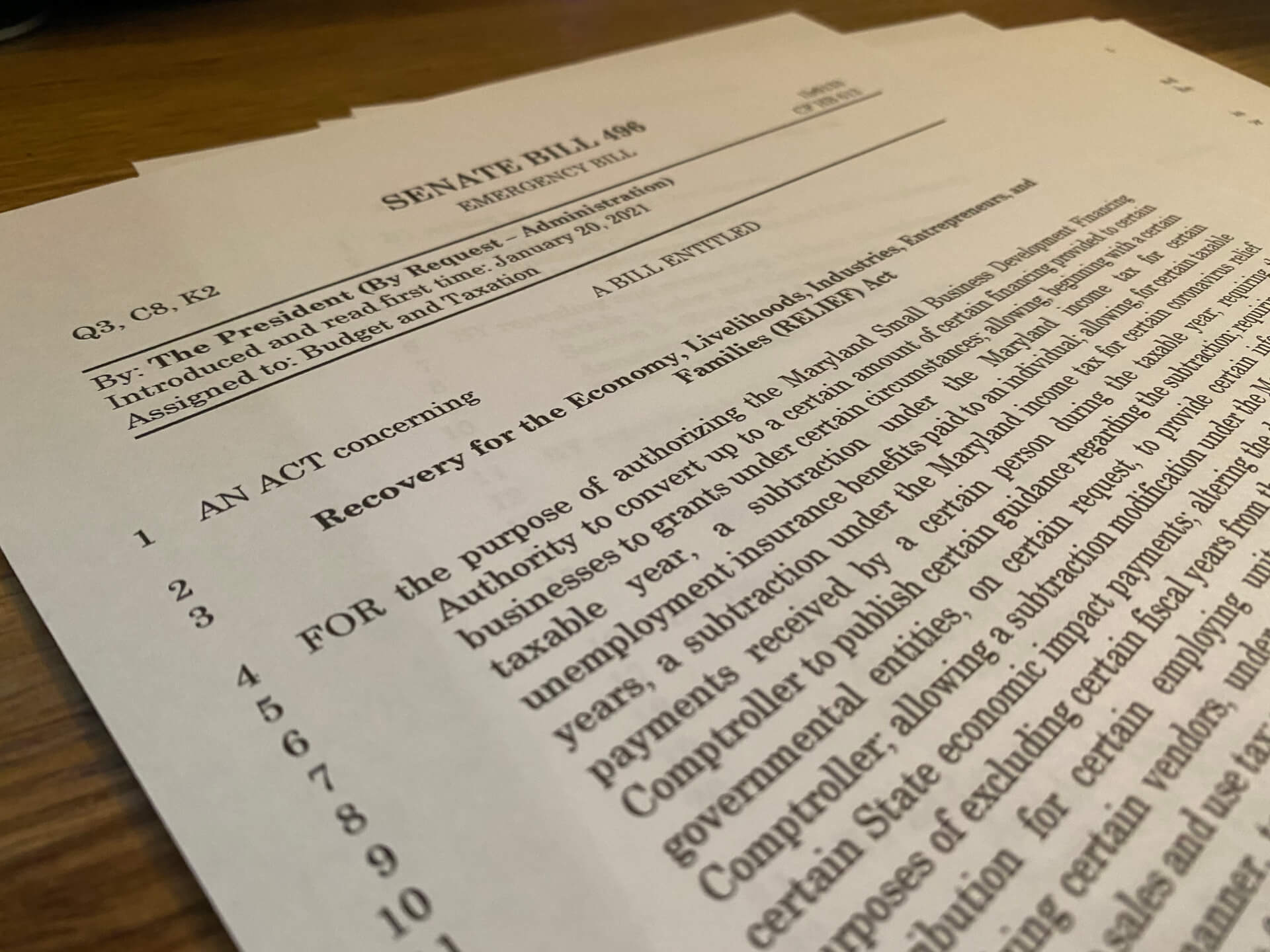Senate Panel Moves Hogan’s RELIEF Act, With an Extra $520 Million

Members of the Maryland Senate Budget and Taxation Committee voted Thursday to move forward with Gov. Lawrence J. Hogan Jr.’s COVID-19 relief proposal – but tacked on an amendment calling for an additional $520 million in spending.
The committee also advanced a proposal to send an additional $577 million over a period of 10 years to the state’s four historically Black colleges and universities.
Committee members unanimously approved Hogan’s RELIEF Act with the Senate’s recently announced “Maryland Senate Recovery Now Amendment” on Thursday after a lengthy hearing earlier in the week. The amendment includes targeted relief money for education, small businesses, Marylanders stuck in adjudication for unemployment benefits and more.
That means the relief proposal, now totaling more than $1.5 billion, could come up for a floor vote in the Senate next week before moving along to the House of Delegates if it’s passed. The House Ways and Means Committee is scheduled to hear the House version of Hogan’s relief legislation next Thursday.
At Thursday’s Senate committee meeting, lawmakers stressed that they’re looking to quickly pass the relief funding for Marylanders and businesses.
Hogan has likewise pushed the legislature to quickly approve his proposal, which includes direct payments for low-to-moderate income Marylanders who filed for an earned income tax credit.
Budget and Taxation Committee Chairman Guy J. Guzzone (D-Howard) laid out how the additional $520 million will be funded: The bill will use state reserve funding, including $320 million from the state’s rainy day fund and roughly $100 million from the local income tax fund.
“This is a perfect example of how to use the rainy day fund,” Guzzone said. “We already have a plan for refurbishing it, literally, within almost the same time-frame.”
Another $100 million will come from money set aside for the proposed Blueprint for Maryland’s Future education reforms. Those reforms were vetoed by Hogan in the early days of the pandemic, but lawmakers plan to override his veto during the upcoming session.
Guzzone said the state has enough money to fund those education reforms through 2026, so lawmakers will have plenty of time to make up for the $100 million being used in the Senate’s amendment. He said that $100 million will go directly toward funding education-related relief efforts.
The amendment includes $50 million for eight weeks of summer school or tutoring for 25,000 Maryland students and another $50 million to help local school districts “safely accelerate to in-person education.”
Guzzone conceded the use of $320 million will bring the state’s rainy day fund below its recommended levels, or 5% of the state’s general fund revenue, but that money will be replenished over the next year or so. He said President Biden’s proposed extension of an enhanced federal match for Medicaid payments will help the state foot the bill.
The state will also divert extra payments into its retirement system, to the tune of $75 million in both 2021 and 2022, to supplement the rainy day fund. Guzzone emphasized that those are extra payments that are usually made in addition to the state’s funding of the pension system, and wouldn’t have any effect on Marylander’s pensions.
“Nothing is being taken away,” Guzzone said.
Committee members prioritized speed over ironing out nitty-gritty details over who will get the money. There are some stipulations about who will receive money from the Senate amendment: Marylanders who are in unemployment adjudication due to allegations of fraud, for example, won’t be eligible for the proposed $1,000 payments.
Additionally, businesses that haven’t received aid will be prioritized for state funding based on which department is funneling out the grants. Guzzone said it’s important for all of the proposed relief aid to “be out the door by the end of the fiscal year.”
“None of this is perfect, quite frankly,” Guzzone said. “It’s our best attempt to try to fill in some gaps.”
HBCU vote
The vote to approve the HBCU funding bill was largely expected, as it’s a top priority of Senate and House leaders. Hogan vetoed a similar measure last year, and for procedural reasons, lawmakers have chosen to reintroduce the legislation rather than attempt to override Hogan’s veto.
The bill is an effort by state lawmakers to settle a years-long lawsuit filed against the state by supporters of the HBCU’s, who have argued that the state has inadequately funded the four campuses and encouraged programs at majority-white institutions that directly compete with those at the HBCU’s.
Because the bill was referred to two separate Senate panels, the Senate Education, Health and Environmental Affairs Committee is scheduled to vote it out on Friday. The House version of the bill, sponsored by Speaker Adrienne A. Jones (D-Baltimore County), was heard in the Appropriations Committee last week.




 Creative Commons Attribution
Creative Commons Attribution